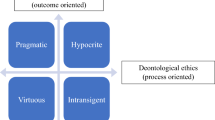Abstract
It is widely recognized that our social and moral environments influence our actions and belief formations. We are never fully immune to the effects of cultural membership. What is not clear, however, is whether these influences excuse average moral agents who fail to scrutinize conventional norms. In this paper, I argue that the lack of extensive public debate about factory farming and, its corollary, extreme animal suffering, is probably due, in part, to affected ignorance. Although a complex phenomenon because of its many manifestations, affected ignorance is morally culpable because it involves a choice not to investigate whether some practice in which one participates in might be immoral. I contend further that James Montmarquet’s set of intellectual virtues can provide a positive account of what it means to act as a responsible moral agent while immersed in a meat eating culture; they also represent the moral and epistemic framework for the kind of public discourse that should be taking place.
Similar content being viewed by others
References
Adams C. (2004), The Sexual Politics of Meat, New York: Continuum Press
Amnesty International, Report on Torture (Duckworth, London, 1973)
Appleby M. C., J. A. Mench, B. O. Hughes (2004), Poultry Behavior and Welfare. Wallingford: CABI Publishing
Bauston G., Battered Birds, Crated Herds: How We Treat the Animals We Eat (Farm Sanctuary, 1996)
Calhoun C. (1989). Responsibility and Reproach. Ethics 99(2):389–406
Costelloe T. (2003). The Invisibility of Evil: Moral Progress and the ‹Animal Holocaust.’ Philosophical Papers 32(2) 109–131
Eisnitz G. (1997), Slaughterhouse: The Shocking Story of Greed, Neglect, and Inhumane Treatment Inside the U.S. Meat Industry. New York: Prometheus Books
Fischer J., M. Ravizza (eds.) (1993), Perspectives on Moral Responsibility. Ithaca, NY: Cornell University Press
Hoagland S. (1993). Femininity, Resistance, and Sabotage. In M. Pearsall (ed.), Women and Values: Readings in Recent Feminist Philosophy. Belmont, CA: Wadsworth Publishing Company
Horrigan L., R. Lawerence, P. Walker (2002). How Sustainable Agriculture Can Address the Environmental and Human Health Harms of Industrial Agriculture. Environmental Health Perspectives 110(5):445–456
Ikuenobe P. (2004), Culture of Racism, Self-Respect, and Blameworthiness. Public Affairs Quarterly 18(1), 27–55
Kaufman, M., “Ex-Pig Farm Manager Charged With Cruelty.” The Washington Post, 9 September (2001)
Kestin S. C., T. G. Knowles, A. E. Tinch, N. G. Gregory (1992), Prevalence of Leg Weakness in Broiler Chickens and its Relationship with Genotype. Veterinary Record 131, 190–194
Levy N. (2003), Cultural Membership and Moral Responsibility. The Monist 86(2), 145–163
Lugones M. (1990), Structure/Antistructure and Agency Under Oppression. The Journal of Philosophy 87(10), 502–515
Moody-Adams M. (1994), Culture, Responsibility, and Affected Ignorance. Ethics 104, 291–309
Montmarquet J. (1993), Epistemic Virtue and Doxastic Responsibility. Lanham: Rowan & Littlefield
Regan T. (2004), Empty Cages: Facing the Challenge of Animal Rights. Maryland: Rowan & Littlefield Publishers
Schonfeld, V. and M. Alaux, The Animals’ Film (People for the Ethical Treatment of Animals, 1981)
Singer P. (2001), Animal Liberation. New York: Harper Perennial
Singer P., J. Mason (2006), The Ethics of What We Eat: Why Our Food Choices Matter. USA: Rodale Books
Slote M. (1982). Is Virtue Possible? Analysis, 42, 70–76
Speigel M. (1996), The Dreaded Comparison: Human and Animal Slavery. New York: Mirror Books
Weaver S. A., M. C. Morris (2004), Science, Pigs, and Politics: A New Zealand Perspective on the Banning of Sow Stalls. Journal of Agricultural and Environmental Ethics 17, 51–66
Weeks C. A., A. Butterworth (2004), Measuring and Auditing Broiler Welfare. Wallingford: CABI Publishing
Acknowledgements
I would like to express my sincere gratitude and appreciation to Wofford College for awarding me a summer research grant in order to complete this project. I would also like to thank the six anonymous referees for providing me with extensive and helpful comments and suggestions on earlier versions of the manuscript.
Author information
Authors and Affiliations
Corresponding author
Rights and permissions
About this article
Cite this article
Williams, N.M. Affected Ignorance And Animal Suffering: Why Our Failure To Debate Factory Farming Puts Us At Moral Risk. J Agric Environ Ethics 21, 371–384 (2008). https://doi.org/10.1007/s10806-008-9087-8
Accepted:
Published:
Issue Date:
DOI: https://doi.org/10.1007/s10806-008-9087-8



